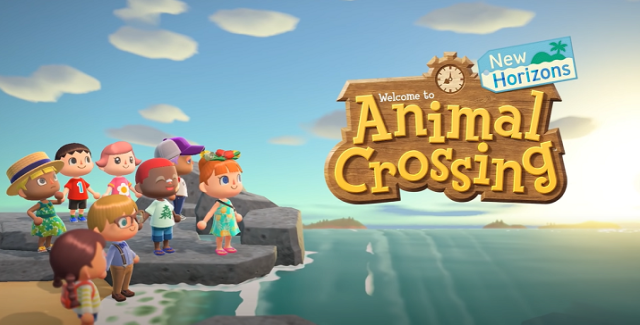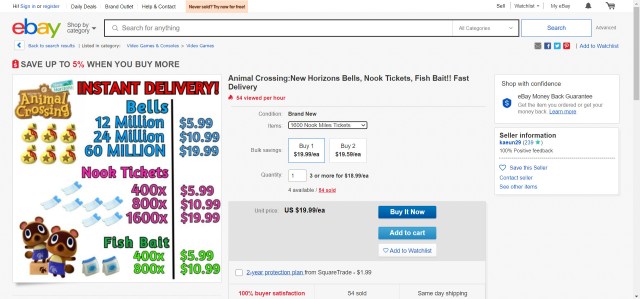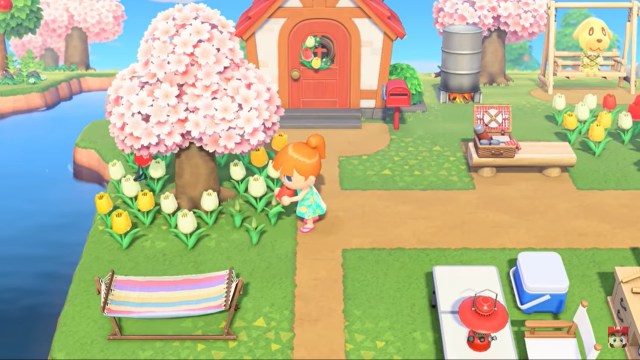
If you’re in the business of “villager trafficking,” you might want to stop soon!
Animal Crossing: New Horizons became the stay-at-home beacon of light for many people throughout the coroanvirus pandemic. Fishing, catching bugs, planting flowers, decorating the island, and inviting friends over–digitally–to share the fun have been a great way for many of us to pass the time while stuck at home.
The key facet of the game is paying off your exorbitant home loans with the in-game currency known as Bells, and this can be done with money earned from selling items like fish, bugs, fossils, and fruit at the Nook’s Cranny shop. But the thing people seem to love most about the game is the huge degree of freedom you have in decorating and organizing your island.
Part of that is the villagers you can invite to live on your island. The villagers are all animals and come with lots of styles and personalities, so for a lot of people, collecting the right villagers is part of maintaining their island’s aesthetic. On top of that, several villagers have become extremely popular and desirable because of their cute looks and personalities.
▼ Raymond, a smart-looking gray cat with two different colored eyes, is exceptionally popular.
https://twitter.com/jaeukiyo_/status/1271004244334612480But where things might go a little too far is when people start buying and selling desirable villagers, Nintendo says. In fact, many players are using “real money trading” (known as RMT among Japanese players) to get whatever items and Villagers they desire. In Japan, Twitter accounts and websites dedicated to the sale of Animal Crossing’s in-game items are plentiful, and in the U.S., a quick browse of eBay shows numerous listings of rare items, villagers, and bells.
A lot of busy Japanese players, who might not have much time to spend on the game, apparently tend to spend their real, hard-earned money on Nook Miles Tickets, which let you travel to uninhabited islands where you can harvest more resources, and which have the potential to catch fish and bugs that fetch a higher selling price. Nook Miles Tickets are a popular listing on eBay, with one listing selling 1,600 tickets for $19.99.
Some sellers even allow visitors access to their “loot island”, where a buyer can visit repeatedly over a certain time frame and take whatever items they want. The standard price appears to be $49.99 for one hour.
Popular villagers in particular can sell for a high price in Japan. Dom, the pink sheep with sad-looking eyes, can sell for 5,000 yen ($46.69), and the universally popular Raymond sells for as much as 8,000 yen.
▼ Just $10 in the U.S., though, it seems.
Clearly there are some people making a good business out of the sale of digital items and characters. But that begs the question about whether making a profit off of a video game like that is legal. After all, according to the Nintendo Network’s Japanese Terms of Use:
“Users may not use Nintendo Network or Nintendo Network Contents to conduct real money trading (the buying and selling of points or other digital currency for real world currency).”
This agreement specifies “points” and “digital currency”, indicating that it may apply only to the game’s currency or the “Nook Miles Points” awarded for accomplishing achievements. J-Cast News contacted Nintendo to find out if buying and selling characters and items also goes against the Terms of Use, and their response was: “We confirm that it is in violation of our Terms of Use.”
It seems they will be dealing with companies and individuals selling in-game items and characters on a case-by-case basis, so if you’re someone who has been participating in this digital black market, you might want to be careful. You don’t want to mess with Nintendo.
Source: J-Cast News via Livedoor News via Hachima Kiko
Top image: YouTube/Nintendo
Insert images: eBay/kaeun29, eBay/jbsdigitalemporium, eBay/jpzin831-7, YouTube/Nintendo
● Want to hear about SoraNews24’s latest articles as soon as they’re published? Follow us on Facebook and Twitter!





 Stay warm with Gelato Pique’s new line of Animal Crossing loungewear coming out this week
Stay warm with Gelato Pique’s new line of Animal Crossing loungewear coming out this week Animal Crossing: New Horizons joins Japanese fashion line Gelato Pique for cute, comfy PJs
Animal Crossing: New Horizons joins Japanese fashion line Gelato Pique for cute, comfy PJs Japanese Animal Crossing fan serves up a steaming hot custom design, Internet recoils in horror
Japanese Animal Crossing fan serves up a steaming hot custom design, Internet recoils in horror Dress your Animal Crossing character in custom fashions by Japanese brand Sig Freak’s Store
Dress your Animal Crossing character in custom fashions by Japanese brand Sig Freak’s Store Nintendo says there are no game overs, EVER, in upcoming Super Mario Odyssey
Nintendo says there are no game overs, EVER, in upcoming Super Mario Odyssey Japan’s new difficult-to-drink-from beer glass protects your liver, but it’s a brutal experience
Japan’s new difficult-to-drink-from beer glass protects your liver, but it’s a brutal experience New Pokémon ice cream, dessert drinks, and cool merch coming to Baskin-Robbins Japan【Pics】
New Pokémon ice cream, dessert drinks, and cool merch coming to Baskin-Robbins Japan【Pics】 New samurai glasses are Japan’s latest weird must-have souvenir
New samurai glasses are Japan’s latest weird must-have souvenir Demon Slayer: Kimetsu no Yaiba gets new roller coaster attractions and food at Universal Studios Japan
Demon Slayer: Kimetsu no Yaiba gets new roller coaster attractions and food at Universal Studios Japan How to order snacks on a Shinkansen bullet train in Japan
How to order snacks on a Shinkansen bullet train in Japan High-fashion Totoro cuddle purse is like an elegant stroll in the forest【Photos】
High-fashion Totoro cuddle purse is like an elegant stroll in the forest【Photos】 Kyoto Tower mascot termination reveals dark side behind cute Japanese characters
Kyoto Tower mascot termination reveals dark side behind cute Japanese characters Caffeinated ramen for gamers that you can eat with one hand going on sale in Japan
Caffeinated ramen for gamers that you can eat with one hand going on sale in Japan Burger King Japan suddenly adds Dr. Pepper and Dr. Pepper floats to its menu nationwide
Burger King Japan suddenly adds Dr. Pepper and Dr. Pepper floats to its menu nationwide Hello, cosmetics! Clinique teams up with Hello Kitty this summer for first-time collaboration
Hello, cosmetics! Clinique teams up with Hello Kitty this summer for first-time collaboration Nintendo history you can feel – Super NES, N64, and GameCube controllers become capsule toys
Nintendo history you can feel – Super NES, N64, and GameCube controllers become capsule toys “The most Delicious Cup Noodle in history” – Japan’s French Cup Noodle wins our heart【Taste test】
“The most Delicious Cup Noodle in history” – Japan’s French Cup Noodle wins our heart【Taste test】 Starbucks releases a cute Frappuccino and Unicorn Cake…but not in Japan
Starbucks releases a cute Frappuccino and Unicorn Cake…but not in Japan McDonald’s Japan’s Soft Twist Tower: A phantom ice cream only sold at select branches
McDonald’s Japan’s Soft Twist Tower: A phantom ice cream only sold at select branches Yabai Ramen: What makes this Japanese ramen so dangerous?
Yabai Ramen: What makes this Japanese ramen so dangerous? Finally! Nintendo Japan expands Switch 8-bit controller sales to everybody, Online member or not
Finally! Nintendo Japan expands Switch 8-bit controller sales to everybody, Online member or not Japanese government wants to build luxury resorts in all national parks for foreign tourists
Japanese government wants to build luxury resorts in all national parks for foreign tourists To combat declining birth rate, Japan to begin offering “Breeding Visas” to foreigners
To combat declining birth rate, Japan to begin offering “Breeding Visas” to foreigners 10 things you should buy at 7-Eleven in Japan
10 things you should buy at 7-Eleven in Japan Studio Ghibli releases anime heroine cosplay dresses that are super comfy to wear
Studio Ghibli releases anime heroine cosplay dresses that are super comfy to wear Woman charged for driving suitcase without a license in Osaka
Woman charged for driving suitcase without a license in Osaka Studio Ghibli unveils My Neighbour Totoro miniature house model
Studio Ghibli unveils My Neighbour Totoro miniature house model Kyoto experiencing problems with foreign tourists not paying for bus fares, but not on purpose
Kyoto experiencing problems with foreign tourists not paying for bus fares, but not on purpose Fighting mild hunger with a Japanese soda that turns into jelly in the stomach【Taste test】
Fighting mild hunger with a Japanese soda that turns into jelly in the stomach【Taste test】 Studio Ghibli’s Howl’s Moving Castle tapestry unveiled in Japan for first time
Studio Ghibli’s Howl’s Moving Castle tapestry unveiled in Japan for first time McDonald’s new Happy Meals offer up cute and practical Sanrio lifestyle goods
McDonald’s new Happy Meals offer up cute and practical Sanrio lifestyle goods Sales of Japan’s most convenient train ticket/shopping payment cards suspended indefinitely
Sales of Japan’s most convenient train ticket/shopping payment cards suspended indefinitely Sold-out Studio Ghibli desktop humidifiers are back so Totoro can help you through the dry season
Sold-out Studio Ghibli desktop humidifiers are back so Totoro can help you through the dry season Japanese government to make first change to romanization spelling rules since the 1950s
Japanese government to make first change to romanization spelling rules since the 1950s Foreigner’s request for help in Tokyo makes us sad for the state of society
Foreigner’s request for help in Tokyo makes us sad for the state of society Ghibli founders Toshio Suzuki and Hayao Miyazaki contribute to Japanese whisky Totoro label design
Ghibli founders Toshio Suzuki and Hayao Miyazaki contribute to Japanese whisky Totoro label design Doraemon found buried at sea as scene from 1993 anime becomes real life【Photos】
Doraemon found buried at sea as scene from 1993 anime becomes real life【Photos】 Tokyo’s most famous Starbucks is closed
Tokyo’s most famous Starbucks is closed Princesses, fruits, and blacksmiths: Study reveals the 30 most unusual family names in Japan
Princesses, fruits, and blacksmiths: Study reveals the 30 most unusual family names in Japan Time to fight! Japan-only Hyrule Warriors special editions come with awesome Triforce clock
Time to fight! Japan-only Hyrule Warriors special editions come with awesome Triforce clock Nintendo eShop closing for 3DS, Wii U next year — Here’s something you might want to do right now
Nintendo eShop closing for 3DS, Wii U next year — Here’s something you might want to do right now Zelda hacker arrested by police in Japan for selling modified Breath of the Wild save data
Zelda hacker arrested by police in Japan for selling modified Breath of the Wild save data How do you beat Bic Camera’s Lucky Box lines, and what’s inside their Sim-Free Phone box?
How do you beat Bic Camera’s Lucky Box lines, and what’s inside their Sim-Free Phone box? Japanese politician scraps plan to use Animal Crossing for political campaign tour
Japanese politician scraps plan to use Animal Crossing for political campaign tour Animal Crossing’s Isabelle confirmed for Smash Brothers Ultimate, fan reactions confirmed loud
Animal Crossing’s Isabelle confirmed for Smash Brothers Ultimate, fan reactions confirmed loud Sorry, kids. The U.S.-based ESRB doesn’t recommend Super Mario Odyssey for gamers under 10
Sorry, kids. The U.S.-based ESRB doesn’t recommend Super Mario Odyssey for gamers under 10 Animal Crossing crosses over with Godiva Japan for extra-sweet sets of Valentine’s chocolates
Animal Crossing crosses over with Godiva Japan for extra-sweet sets of Valentine’s chocolates Man arrested in Japan for selling modified Pokémon to Sword and Shield players
Man arrested in Japan for selling modified Pokémon to Sword and Shield players Nintendo takes steps to protect staff from growing problem of customer harassment
Nintendo takes steps to protect staff from growing problem of customer harassment Practical Zelda Tears of the Kingdom merch is here to be Hyrule-helpful in your daily life【Pics】
Practical Zelda Tears of the Kingdom merch is here to be Hyrule-helpful in your daily life【Pics】 Nintendo issues warning about scam sites pretending to be the company’s official homepage
Nintendo issues warning about scam sites pretending to be the company’s official homepage Tokyo’s dedicated Nintendo store finally begins offering its exclusive items online
Tokyo’s dedicated Nintendo store finally begins offering its exclusive items online Great deals on edible scorpions and more at Village Vanguard this holiday season!
Great deals on edible scorpions and more at Village Vanguard this holiday season! New line of Super Mario loungewear has the perfect pajamas for your stay-at-home life
New line of Super Mario loungewear has the perfect pajamas for your stay-at-home life
Leave a Reply